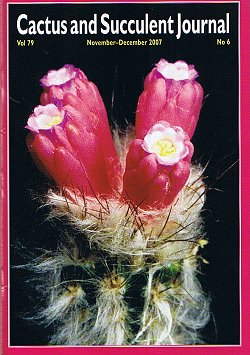| CSSA VOL.79, November-December 2007 No.6 |
|---|
| Acharagma aguirreanum in Sierra de la Paila A rare find in cactus paradise | Zlatko Janeba and Richard Kalas |
| Some succulent memories Part 2: Life in a botanical garden | Myron Kimnach |
| Beautiful and Bizarre Arrojadoa The taxonomy of subgenus Albertbuiningia | Pierre J Braun and Eddie Esteves Pereira |
| Lithops from seed to scanner bed Part 2: Adult plant care | D Russell Wagner |
| Portuguese succulents | Ray Stevenson |
| Aloe djiboutiensis and Aloe ericahenriettae, two new species from Djibouti And the mystery of Aloe eumossawana's natural habitat solved | Tom McCoy |
| Cochemiea halei on peninsular Baja California Sur | Root Gorelick |
Low-water gardening books reviewed
Lush and efficient, landscape gardening in the Coachella Valley The low-water flower gardener, guide to growing over 270 unthirsty colorful plants by Eric A Johnson and Scott Millard
Waterwise gardening tour, University of California Botanical Garden Subtropical and dry climate plants, the definitive guide by Mortyn Rix | Dylan Hannon |
Book Review
Socotra, A natural history of the islands and their people by Catherine Cheung and L DeVantier
| Dylan Hanlon |
Books on the Sonoran Desert reviewed
Dry Borders, Great natural reserves of the Sonoran Desert edited by Richard Stephen Felger and Bill Broyles
Sonoran desert plants: An ecological atlas by Raymond M Turner, Janice E Bowers, and Tony L Burgess | Root Gorelick |
Reviews
Australian succulent plants, an introduction by Attila Kapitany
Bradleya 25, Yearbook of the British Cactus and Succulent Society
The genus Sclerocactus CD-ROM by Fritz Hochstätter
Yucca, Agavaceae CD-ROM by Fritz Hochstätter | D Russell Wagner |
| Succulents on Stamps Mammillaria, Part 2 | Peg Spaete |
| 
On the cover. This month Brazilian cactus expert Pierre Braun brings us the bizarre and beautiful members of Arrojadoa, including our cover model, Arrojadoa eriocaulis. Its beautiful hummingbird-pollinated flowers are formed from a cephalium at the top of a thin stem, which itself emerges from a single, large, underground tuber. Each year normal stem growth resumes to leave fuzzy skirts along the stem that indicate its age. After three or four seasons of growth the stem will senesce and be replaced. While not particularly common in collections, cultivation is easy; if the stems are grafted they can grow a meter or more long. |



